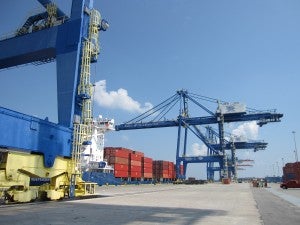MAF 564: Port Planning and Policy

LEC: SPRING 2015 | 3 units | Time: T/Th 9:30 10:45 |
Location: Coastal Institute 200a
Prof. Austin Becker
Coastal Institute 213
Email: abecker@uri.edu
Office hours: By appointment
Writing Consultant
TBD – Assigned by writing center
Email TBD
Course Description:
This course introduces students to port operations, planning, and policy with a particular emphasis on the role of stakeholders and the new challenges presented by climate change. Ports link international supply-chains, comprising a critical piece of the global economy and trading system. Civilization evolved in large part due to this vast maritime transportation system. Many stakeholders benefit from the port and play various roles in operations, planning, and policy. This course will examine how groups such as port authorities, tenants, public agencies, non-profits, and research institutes, interact with the port system and shape its future.
This course also focuses on the pressing problem of climate change adaptation. Many of the world’s ports, which handle over 80 percent of global trade, are highly vulnerable to a range of climate-related impacts, including temporary and permanent flooding arising from sea-level rise, high winds and storm surges.
Key questions:
- How and why have ports evolved over the past century?
- What are some key requirements for a port to thrive?
- How does operation and management differ along the spectrum of private to public ports?
- Who are the stakeholders of a port and what are their goals and priorities with respect to the port?
- What new challenges does climate change present for port planning and development?
- What role do different organizations play in seaport management? In adaptation?
Student learning outcomes
By the end of this course, students in MAF 564 will be able to:
- Write a research paper on a topic of their choice related to the focus of this class
- Demonstrate knowledge of the mechanics and process of writing for an academic audience, such as a peer-reviewed journal.
- Assemble into a final product, the components of a research paper (title, abstract, introduction, methods, results, discussion, tables/figures)
- Choose an appropriate research question or topic
- Describe how the peer review process works
- Give meaningful feedback
- Present information concisely and effectively in written and visual form
- Describe the key stakeholders of a port system
- Identify the key components of a port master plan
